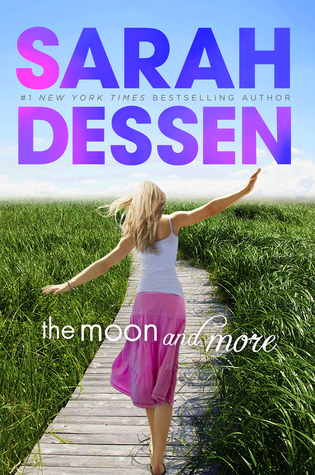
Sarah Dessen’s The Moon and More and Why Literary Writers Should Read More YA
I’m not the oldest writer around, but it’s been quite some time since my reading list was packed exclusively with books intended for children or young adults. My relationship with children’s literature was complicated by the fact that I don’t recall reading a single picturebook, but I do recall successfully talking the school librarians into letting me borrow books that had more space for words than images. It wasn’t long after that that I was dipping into my father’s Stephen King collection and I was much more interested in Forever than Blubber when I wanted to read some Judy Blume.
Then one day about a decade ago, I was on the subway heading back to Flushing, the town so nice that they named it for what a toilet does. I was reading an advanced reading copy that I had bought from The Strand. Scott Westerfeld’s So Yesterday was so much fun! And the characters were so engaging! And stuff was happening! I was halfway through the book and halfway home when I realized that the book was a Young Adult book. Written primarily with a teenage audience in mind.
In the aftermath of that experience, I picked up YA books from time to time, but I really ramped up my consumption of those works when I had the idea for my own YA book. YA is a fun and vibrant genre that has a lot to teach us stuffy MFA-type literary writers; if we want to create new readers, we should borrow liberally from what YA writers are doing.
One of the books I read recently was Sarah Dessen‘s The Moon & More. Ms. Dessen is the fantastically successful author of about a zillion YA novels; this one is about a young woman named Emaline, whose family owns a beach resort in North Carolina. Ms. Dessen introduces everyone in a graceful first chapter that sends Emaline around the resort, establishing the setting and characters of the book. Emaline has a long-term boyfriend named Luke who looks good without a shirt on. Emaline is in an interesting and common family situation; she lives with her mother and stepfather, a man she calls her “Dad.” Twenty-three of Emaline’s chromosomes came from the son of a rich family who only contributed money to his daughter’s life. While that’s better than nothing, her “father” (her title for him) has only been a tangential part of Emaline’s life. In the years you would expect a teen to do so, she pestered her mother to help her make a connection. Since then, her father has seen her on occasion and discussed novels with her. This is the status quo in Colby, North Carolina as the novel begins.
Here’s the book trailer:
Ms. Dessen shrewdly employs many of the powerful techniques common to some of my favorite YA novels. (Techniques that should be more common in traditional literary work…) First of all…the book is fun. Ms. Dessen’s writing is funny. The books is not a self-conscious slog through a character’s psychology. Emaline is a deep and funny character in a story populated with many of the same. There isn’t enough humor in contemporary literary literature; everything must be so important and meaningful in a self-conscious manner. The Moon & More certainly has a message, but here’s the crucial point: Ms. Dessen puts storytelling ahead of message. Emeline’s story deals with the powerful themes of late-adolescent love, the pain of parental neglect (a personal favorite theme of mine), class struggles between those who live in resort towns year-round and those who skip in when the weather is nice and more. But the book is primarily an exercise in Ms. Dessen enticing me to read on. How does she do this?
The narrative questions in Ms. Dessen’s book (and in most entertaining books) deal with the What Happens Next? instead of the Why Did That Happen? Ms. Dessen asks questions that propel the reader…in my case, they make me read on instead of trying to work on my own stuff.
- What is going to happen between Emeline and Luke?
- What is going to happen when Emeline’s father shows up?
- What is going to happen with the documentary about the artist?
- What is going to happen between Morris and Daisy?
These are the kinds of questions that get the most people interested in reading. Think of it in terms of Law & Order. What keeps people tuning in? Would you throw away a lazy Saturday on a Law & Order marathon if the writers were interested in answering questions like these?:
- Why did Olivia wear those shoes this morning?
- What was Fin thinking as he drank his morning coffee? (And your answer must be at least four pages long.)
Of course not. You would turn the channel because the author is not singing for his or her supper. Ms. Dessen’s work bears the mark of excellent craft, to be sure. More importantly, she is a skilled storyteller who offers you a peek into an exciting and emotional time in a complicated character’s life. Isn’t this what writing is all about?

Leave a Reply